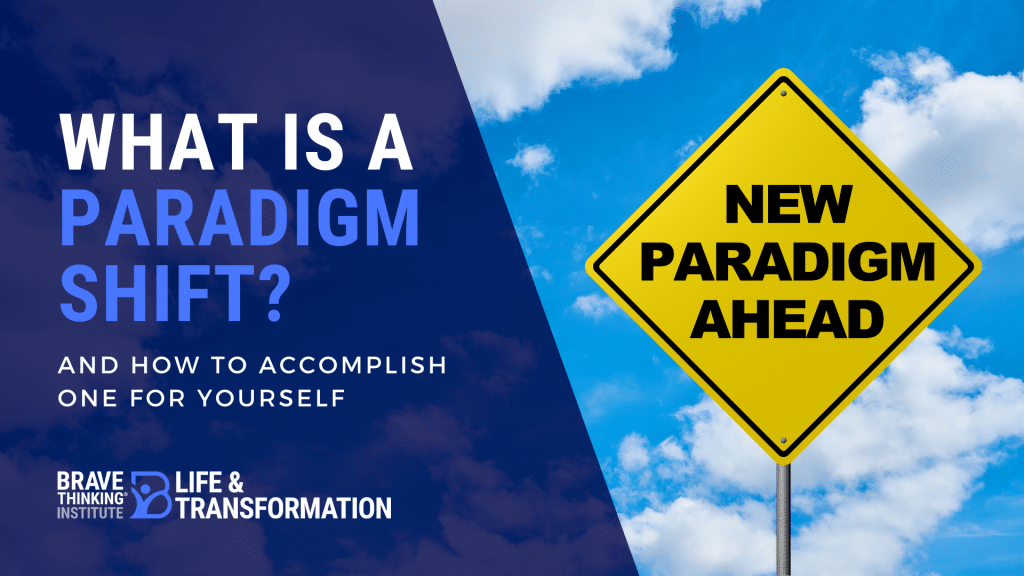What is a paradigm shift and how does it affect your life?
If you aren’t living a life you absolutely love, it’s likely because your current paradigms aren’t serving you.
In fact, most people’s paradigms cause them to procrastinate on the very things that would help them create a life they’d truly love living.

Jump to:
4 Phases of Shifting a Paradigm
3 Proven Steps You Can Use to Create a New Paradigm
What is a paradigm?
In order to define paradigms in a way that doesn’t just help you understand what they are, but that also empowers you to create significant change in your life, we have to begin with a little science.
The term “paradigm” was first coined by physicist and philosopher Thomas Kuhn to mean, in the simplest terms, “a basic framework of assumptions, principals and methods.”
Kuhn rejected the idea that scientific conclusions were created gradually, over time. Unlike earlier theories that scientific knowledge was always slowly, progressively moving in the right direction, Kuhn’s view suggested that advancement was a result of revolutionary science.
Think of it like this: Any given time, scientists are all working on the same basic assumptions about what is true about the world around them. That collection of assumptions is the established paradigm.
Just before a major advancement occurs, scientists begin to discover problems and questions that challenge what they thought was true.
Then, what had been the generally accepted point of view is replaced with a new model of understanding accounts for the problems and questions scientists had experienced.
According to Kuhn, the transition from an old paradigm to a new paradigm occurs in 4 stages, and is the basis for how the scientific community shifts from one way of understanding the world to something new.
Since Kuhn’s claim, published in his book The Structure of Scientific Revolutions, this way of understanding the process of change has been applied to many other disciplines, including art, politics, and psychology.
Just like in science, your paradigms are a collection of assumptions you’ve learned about what is true. These thought patterns produce habits- the patterned ways human beings respond to the problems they experience- inform decision making, and influence behaviors.
Habits, decisions, and behaviors ultimately produce results.
We all have paradigms in each area of our lives. Paradigms can be inherited from our parents and caretakers, born out of trauma or struggle, or taught to us as a part of our culture, religion, or education.
And even though they can be the root cause of results we may not love, paradigms aren’t inherently good or bad. Like scientific theories, your paradigms are simply a collection of information.
Paradigms can be expansive – those that serve you and create growth in an area of your life, or contractive – those that present challenges and produce less-than-ideal results in your life.
Some of your paradigms may be working great for you, while others may be keeping you stuck.
If you want to know which category your current paradigms fall under, all you have to do is look at your current results – because your results are a perfect mirror for the paradigms that you’re holding.
The good news is, just like in the scientific model above, you can also shift your paradigms to be in greater alignment with the life you want to manifest!
Think of a paradigm shift like this…
Before you build a house, you need a blueprint for it – a pattern or plan for h
Before you build a house, you need a blueprint– a pattern or plan to ensure that the house being built looks and functions the way it should.
Paradigms are like blueprints, or plans, for specific results in your life.
If you want to change something about the house you’re building, you change the blueprint first.
The same goes for shifting your paradigms to generate different results in your life!
Creating a paradigm shift begins with awareness. Once you recognize that you have a paradigm in place, you have the power to change it.
You have many paradigms in place in all areas of your life…but you may not recognize what those paradigms are or where they may have come from.
With those paradigms, you are always creating results in your life. To help you assess your current paradigms, you can divide the results you’re experiencing into four key areas: time and money freedom, health and wellbeing, relationships, and vocation.
Before you can practice and benefit from a new belief, it’s helpful to identify the current self-limiting paradigms that are holding you back.
Common paradigms holding you back
Here are some examples of common contractive paradigms in each of the four key areas I mentioned above. As you read, see if you can identify where your own paradigms are holding you back in life.
Time and money freedom paradigms
If you have experienced struggle in the area of time and money freedom, you aren’t alone!
At Brave Thinking Institute, we often see people struggle with constrictive money paradigms like:
- It’s wrong to love money
- Wanting more money makes me unspiritual
- Money is the root of all evil
- Wealthy people are greedy, lonely, controlling, unhappy, etc.
- I’m not responsible enough to manage a lot of money
These common paradigms can keep people from experiencing more abundance in their lives! After all, if a part of you sincerely believes that wealthy people are lonely and unhappy, why would you ever create wealth in your life?
Likewise, when it comes to time freedom, you might be holding onto constrictive paradigms that include:
- My calendar has to be full of obligations in order to be productive and successful
- Work comes before play
- I’m not good at managing my time
- I have to keep busy to stay out of trouble
- My value comes from how much I can accomplish
- It’s irresponsible to relax while there’s still work to do
You may not have ever realized it, but your relationship to your calendar reflects powerful paradigms you have in place about how you spend your time!
And if you’ve wished that your days and weeks could look and feel differently, you may need to address your limiting paradigms.
Health and well-being paradigms
When it comes to health and well-being, many people adopt the paradigm that so long as their physical health is robust – that they get annual physicals, exercise and eat well – that they’re in optimal health. But health is so much more than physical wellness alone!
Did you know, for example, that realizing and living your purpose in life is one of the biggest factors in your overall well being, and can actually increase your life expectancy?
Health and wellness includes your physical health as well as your mental and emotional health.
Your health may be impacted by paradigms like:
- I have bad genetics. Being born into my family is a health risk I can’t get around.
- I’ll never lose weight no matter how hard I try
- Progress requires perfection
- No pain, no gain
- I’m too old to change my health now
- I’m not allowed to express my… [anger, disappointment, sadness, etc.]
- Change is too hard; why bother?
Relationships paradigms
Relationships, romantic and otherwise, impact nearly every area of our lives.
Paradigms around relationships can include:
- Relationships are just hard (hint: if you find yourself in difficult relationships, this may be one of your paradigms)
- Forgiveness and letting to of resentment means I’m letting them off the hook for what they did
- I’m not enough. I don’t deserve love.
- I can’t be loved for who I am; finding love means I have to change
- People just don’t like me
- Friends always betray you eventually
- I can only rely on myself
Reflect on your personal relationships for a moment. Are there patterns you see in your friendships or romantic partnerships? Have the relationships in your life been less than ideal?
If so, you likely have paradigms in place that are subconsciously at work.
Vocation paradigms
One of the most common reasons why we procrastinate on our dreams is that our current paradigms like to keep us comfortable where we are.
This is often especially true around the experience of vocation and career.
Our limiting paradigms around the vocations we feel called to might sound like:
- That goal is irrational or too big to achieve
- I’ll have to sacrifice financial stability when pursuing a vocation that I’d truly love
- It’s irresponsible to give up my dependable career for something more fulfilling
- I’m too old to start over again
- People will judge me if I start another new career
- I should be grateful for the job I already have
These paradigms can keep you in a job or field that isn’t truly fulfilling.

4 Phases of Shifting a Paradigm
We all have paradigms in place that generate results in our life that we may, or may not, be in love with.
But the great news is that you can shift your paradigms in order to generate different results in your life.
Before I give you three steps to create new paradigms for yourself, we’re going to go back to the science for a moment.
Kuhn proposed that there were four phases to shifting a paradigm, and those phases apply to your life as well!
This understanding isn’t necessary to work on your own limiting paradigms, but understanding how paradigm shifts occur can help you generate faster, more powerful results.
Phase 1: Pre-Science
The first phase of the Kuhn cycle is called “Pre-science.” This is the period of time before an established paradigm exists. Your “pre-science” phase likely took place throughout your childhood and adolescence.
Think of phase 1 as the time when your blueprint was being established. You were observing, absorbing, and learning what you believed from your parents, family, teachers, and friends.
The significant learning stages that took place while you were growing up resulted in the assumptions and beliefs you now have- your paradigms.
Phase 2: Normal Science
The “Normal Science” phase in Kuhn’s model is the period of time in which everyone is going about business as usual, working with whatever paradigms had already been established.
In this phase, no one is considering a different way of doing things.
All the times before you recognized that your current paradigms weren’t working was the “normal science” phase.. You may not have even realized there were paradigms impacting your results at all!
Most people spend most of their lives in this phase, never questioning the prevailing paradigm impacting their lives.
Phase 3: Crisis
In order to implement a new paradigm long term, rep
In science, the “Crisis” is the moment that there is a realization that something isn’t quite adding up. Scientists in this phase suddenly find themselves with questions or problems that aren’t responding to how things had always been done.
You, too, may have experienced “crisis” moments in your life that helped you realize the way you’ve been doing things hasn’t been working.
Maybe even reading this post has helped you realize that you have a paradigm keeping you stuck that you aren’t yet sure how to resolve. That in itself is a crisis moment.
Some people experience a crisis moment realization and go back to doing just what they’ve always done… but you have the opportunity to change your results by changing your response, starting now!
Phase 4: Revolution
This is the phase in which a new paradigm is established.
In your life, establishing a new paradigm will result in better, more desired results (a.k.a the life of your dreams)!
But, you may be wondering what you can actually do now to help establish a new paradigm…
3 Key Steps to Establishing a New Paradigm
Step 1. Identify an “impact moment”
An impact moment is an “a-Ha!” moment in which you recognize a contractive paradigm that you’ve been holding onto, maybe without even realizing it.
Identifying an impact moment is a powerful step because it involves recognizing a result in your life that you’re unhappy with and taking responsibility for it.
In this step, you may also wish to take the time to identify what existing paradigm is leading to the undesired result and where you may have learned it.
2. Immerse yourself in a new paradigm
In order to replace an existing paradigm, you have to actually choose a new one that might serve you better.
Identify a new potential paradigm by choosing a belief statement that is more true and more in line with accomplishing your goals.
For example:
- If you believe, “Wanting more money makes me unspiritual”, you might replace it with: “The more resources I have, the more good I can do in the world.”
- If you believe, “Work comes before play”, you might replace it with: “When I give myself permission to play, the work I do is better and more productive.”
- If you believe, “No pain, no gain”, you might replace it with: “Struggle doesn’t guarantee success. Even effort that feels easy makes progress.”
- If you believe, “Forgiveness means I’m letting them off the hook”, you might replace it with: “Forgiveness sets me free. I don’t have to suffer to hold them responsible.”
- If you believe, “I should be grateful for the job I already have”, you might replace it with: “I can be grateful for the job I have and I am ready for something greater.”
Then, immerse yourself in your new, chosen belief. This can involve journaling, reciting mantras, listening to meditations, attending personal development events, and so on.
The key is to surround yourself with and support your new thought pattern in any way possible.
3. Embrace repetition
In order to implement a new paradigm long term, repetition is key.
Just like a new habit often takes 90 days to stick, thought patterns take time to become second nature and to generate the results you desire.
So whatever immersion techniques you choose, keep doing them!
Eventually you’ll have an entirely new system of paradigms at work in your life, and your results will show it!

Understanding Paradigms is Power
Remember, you are far more powerful than any circumstance, situation or conditions you will ever find yourself in.
You can’t always control what happens in your life, but you can always control how you choose to respond.
By understanding and becoming aware of your paradigms, you can ensure you have expansive and empowering beliefs in place.
You’ll be truly astounded by how quickly you’re able to shift your thoughts and create extraordinary results in your life that you’re absolutely in love with!
However, if you’re one of the many people who knows they want more in life, but aren’t quite sure what it is they truly desire…
Or, if you’ve tried to make significant changes in your life before, but feel like you always end up getting stuck…
I know taking control of your paradigms can feel especially challenging.
If either of those feel true for you, my free, upcoming Online Masterclass would be perfect for you.
Take the next step to supercharging your results!






Hi! thank you for the info. I found it to be very helpful. May Almighty God bless you at all times with health, joy, peace, and understanding.🕊️🇵🇷
Unless there is harmony with BODY, MIND, and SPIRIT, the three dimensions of CONSCIOUSNESS life as we experience, create, and think it will never be fulfilled.
Emphasis on any one dimension intentionally or unintentionally does not afford the balance for the whole system and its natural correspondences to MANIFEST to create the vibrations and resonances needed for the interactions or forces needed to generate the plethora of energy fields mapped in the physiology of the human complex. The creative, emotional, psychological, and mental acuities lack the functionality that can lift the complex to any higher levels of CONSCIOUSNESS and the expressions of form, or word, image, and action. Material Capitalism is one of the major deterrents undermining the true human potential. The self-development movement is next. Not understanding the beauty and simplicity of this threefold TRIADIC symmetry that transmutes into the four interactions of the praxis and its LAW is a key missing element. The combination is lethal and disruptive.